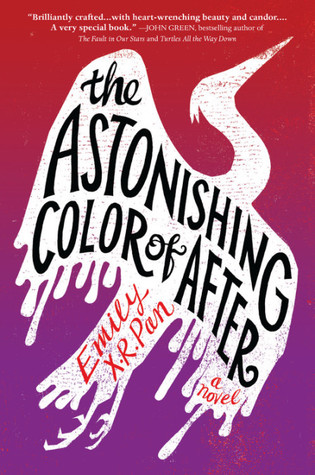 Book of the Month sometimes has some interesting selections. They tend to be mostly literary fiction or suspense/thriller; I guess the judges' favored genres tend in this direction. However, every now and then something very different slips in. Something like Exit West or this one, The Astonishing Color of After, which has a definitive magical realism bend to it.
Book of the Month sometimes has some interesting selections. They tend to be mostly literary fiction or suspense/thriller; I guess the judges' favored genres tend in this direction. However, every now and then something very different slips in. Something like Exit West or this one, The Astonishing Color of After, which has a definitive magical realism bend to it.The story is about Leigh, whose mother commits suicide while Leigh is finally, finally kissing her best friend, Axel. But while Leigh's mother might be dead, she is not gone, because Leigh is one thousand percent certain that instead of going away, her mother has become a red bird. Her father thinks she's crazy, but some strange occurrences as well, and he takes Leigh to Taiwan to meet her maternal grandparents, whom Leigh has never seen due to a rift between them and her mother. Leigh wants to find her mother, to figure out what she's supposed to know or remember, and finds herself on that quest with her grandmother and a strange young woman named Feng.
This is an interesting take on magical realism. The things that Leigh experiences are definitely happening. They are not in her head. Other people even sometimes acknowledge them. But there's a whole aspect to it that only Leigh notices, that only she can see, or only she can remember, and I haven't encountered that in other magical realism books, which tend to have everyday magic more closely woven into the real world as a whole. I spent a lot of the book flopping between "it's magical realism, no, it's just plain fantasy," but overall I think that magical realism is a more apt descriptor, just given how the magical plays into the story and characters.
Most of this book is set in Taiwan, but there are also flashbacks to parts of other people's lives and Leigh's own evolving relationship with Axel. I really liked Leigh and Axel. They're teenagers, and they do stupid things and have stupid fights, but their pull is undeniable. They have a connection, and despite Leigh shutting down after her mother's suicide, that connection persists and grows even when they're separate and not talking...with a little magical help, of course. But I think the aspect of this book that most intrigued me was Feng. I had some idea of who she had to be, but I think Pan did a good job of concealing her true origins and revealing them in a way that wasn't designed to trick you but to make you put together all of the little pieces that had come before.
There were some things I didn't like, however. First, Leigh's father is horrible. Not in a typical "Leigh is a teenager and doesn't get along with her father" type of way, but in a "I knew my wife was depressed and so I pretty much abandoned her and my daughter rather than deal with it" type of way. He hates that Leigh loves art. He sends her off to a camp that she hates to the very depths of her soul and doesn't tell her anything regarding her mother's health, even though Leigh is the one who cares for her mother, because her father isn't present. Pan tries to reconcile Leigh and her father at the end, but I am not at all convinced that he would suddenly become so supportive of her, or that he would become an involved father.
Second...can we talk about the pretentious color words? Pan uses so many descriptive color words that I have never, ever encountered before, and I have a large vocabulary and am widely read. Which means if I haven't encountered these words, I doubt her target young adult audience has. I actually started highlighting them as I went through the book, there were so many! The result is that there would be "[some crazy word] orange" and I would just disregard the descriptor, because "orange" was the part that mattered. There are so many words for colors and hues and shades that the average reader knows, so I'm not sure why Pan veered away from those and to these spelling bee ones instead.
Overall, I did like this quite a bit. Leigh's father was awful and the vocabulary was eye-roll worthy at times, but the story itself is solid. The magical realism is done well, Leigh is a compelling main character, and the setting of Taiwan is a strong one.
4 stars out of 5.
No comments:
Post a Comment